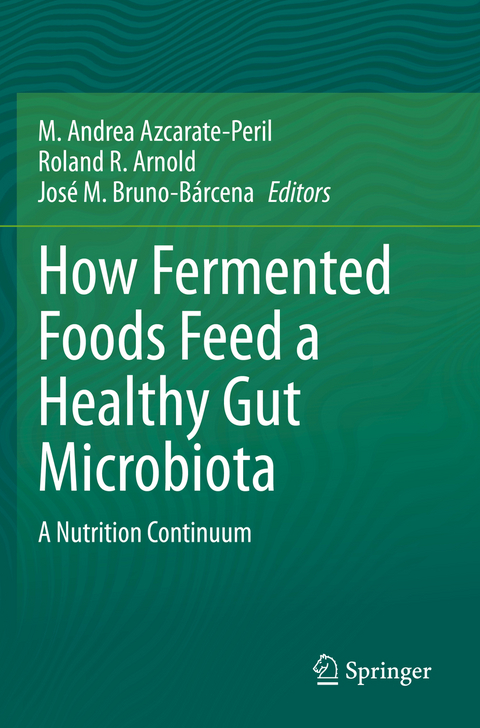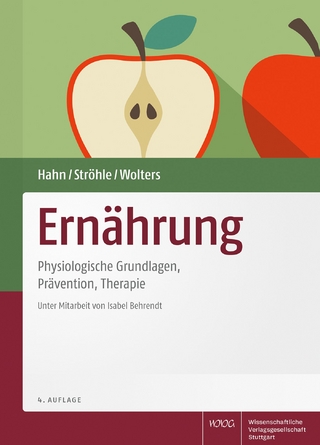
How Fermented Foods Feed a Healthy Gut Microbiota
Springer International Publishing (Verlag)
978-3-030-28739-9 (ISBN)
This book examines the role of fermented foods on human gut health and offers a unique contribution to this rapidly growing area of study. Fermented foods have been consumed by humans for millennia. This method of food preservation provided early humans with beneficial bacteria that re-populated the gut microbiota upon consumption. However, novel methods of production and conservation of food have led to severed ties between the food that modern humans consume and the gut microbiota. As a consequence, there has been a documented increase in the prevalence of autoimmune diseases and obesity, which has been correlated to decreased diversity of gut microbes, while infectious disorders have decreased in the three past decades.
With the intention of providing a thorough overview of the relationship between fermented foods, nutrition, and health, the editors have grouped the chapters into three thematic sections: food and their associated microbes, the oral microbiome, and the gut microbiome. After an introduction dedicated to the environmental microbiome, Part I provides an overview of what is currently known about the microbes associated with different foods, and compares traditional forms of food preparation with current industrial techniques in terms of the potential loss of microbial diversity. The chapters in Part 2 explore the oral microbiota as a microbial gatekeeper and main contributor to the gut microbiota. Part 3 introduces beneficial modulators of the gut microbiome starting with the establishment of a healthy gut microbiota during infancy, and continuing with the role of probiotics and prebiotics in health preservation and the imbalances of the gut microbiota. In the final section the editors offer concluding remarks and provide a view of the future brought by the microbiome research revolution.This study is unique in its emphasis on the convergence of two very relevant fields of research: the field of studies on Lactic Acid Bacteria (LAB) and fermented foods, and microbiome research. The relationship between these fields, as presented by the research in this volume, demonstrates the intimate connection between fermented foods, the oral and gut microbiota, and human health. Although research has been done on the impact of diet on the gut microbiome there are no publications addressing the restorative role of food as microbe provider to the gut microbiota. This novel approach makes the edited volume a key resource for scientific researchers working in this field.M. Andrea Azcarate-Peril, Ph. D. is Associate Professor of Medicine, GI Division in the School of Medicine at UNC Chapel Hill. She is also the founding and current Director of the UNC Microbiome Core, which provides research and technical support to investigators interested in addressing the roles of the host-associated microbiota in health and disease.Dr. Azcarate-Peril is a microbiologist by training and has extensive experience in the characterization of complex microbial populations and functional metagenomics using culture-dependent and culture-independent methods including Next Generation Sequencing. Her research projects have focused on functional genomics of probiotics and gut microbiome modulation by prebiotics for over 20 years, resulting in over 65 peer-reviewed publications. Dr. Azcarate-Peril's current projects aim to define modulators of the gut microbiome capable of reversing dysbioses induced by age, diet and nutritional behaviors. She is particularly interested in the development of application-directed probiotic strains to address and prevent gastrointestinal disorders. Roland R. Arnold, Ph. D. is Professor of Periodontics and Diagnostic Science in the School of Dentistry at the University of North Carolina, Chapel Hill since 1991. Dr. Arnold is also the Director of the UNC Oral Microbiology Lab. He is microbiologist with extensive expertise in the bacteria that inhabits the human oral cavity. He is a member of the American Association Immunologists, American Association Dental Research, American Society for Microbiologists, and Omicron Kappa Upsilon. His career has generated over 70 peer-reviewed publications. Jose M. Bruno-Barcena, Ph.D. is Associate Professor of Microbiology in the Department of Plant and Microbial Biology at NC State University. Dr. Bruno-Barcena is a translational industrial microbiologist with an effective research program, which includes strong collaborative relationships within the biotechnology industry, and a passion for bioprocess workforce training. During the last two decades at NCSU he contributed to the teaching, training, and service mission of the University including inter and intra college teaching efforts with interactions at all levels, from undergraduate and graduate students to industry outreach programs including training of professionals and US Food and Drug Administration (FDA) inspectors. His research projects focus on microbial physiology, exploring bioreactor technology and traditional fermentation processes using renewable carbon sources. He currently aims to study the physiology of gut microbial communities using traditional preclinical in vivo models as well as in vitro approaches involving cultivation of infant gut microbial communities using packed-bed reactors. He has published over 35 peer-reviewed publications, 6 book chapters, and 8 invention disclosures.
Introduction: The environmental microbiome and the interdependence of all life., Part 1 - Foods and their associated microbes., Chapter 1. Infant nutrition: The microbiome of breast milk., Chapter 2. Dairy: Cheese and yogurt., Chapter 3. Breads., Chapter 4. Meats., Chapter 5. Vegetables., Chapter 6. Current methods of production and conservation of food., Part 2 - The oral microbiome as gatekeeper., Chapter 1. The healthy oral microbiota., Chapter 2. Dysbioses of the oral microbiota and disease., Chapter 3. The role on uncultivable organisms in oral health., Chapter 4. The oral microbiome and health implications., Part 3 - Gut Microbiome., Chapter 1. Early gut microbiome, a good start in nutrition and growth may have lifelong lasting consequences., Chapter 2. Probiotics., Chapter 3. Prebiotics., Chapter 4. The disappearing microbiota: Diseases of the Western civilization., Chapter 5. Infectious diseases and Antibiotics., Chapter 6. The future: Personalized nutrition.
| Erscheinungsdatum | 24.12.2020 |
|---|---|
| Zusatzinfo | XII, 366 p. 15 illus., 12 illus. in color. |
| Verlagsort | Cham |
| Sprache | englisch |
| Maße | 155 x 235 mm |
| Gewicht | 577 g |
| Themenwelt | Medizin / Pharmazie ► Gesundheitsfachberufe ► Diätassistenz / Ernährungsberatung |
| Naturwissenschaften ► Biologie ► Biochemie | |
| Naturwissenschaften ► Biologie ► Mikrobiologie / Immunologie | |
| Technik ► Lebensmitteltechnologie | |
| Schlagworte | food microbes • Oral microbiome • Personalized Nutrition • prebiotics • Probiotics |
| ISBN-10 | 3-030-28739-4 / 3030287394 |
| ISBN-13 | 978-3-030-28739-9 / 9783030287399 |
| Zustand | Neuware |
| Haben Sie eine Frage zum Produkt? |
aus dem Bereich


